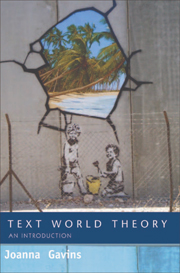2 - Participating in Discourse
Published online by Cambridge University Press: 05 August 2013
Summary
KEY ISSUES IN THIS CHAPTER
Text World Theory begins its exploration of communication and the mind at the immediate level of discourse production and reception. In keeping with its cognitivist principles, it attributes primacy to the human experience of language and takes the face-to-face interaction between living, thinking human beings as the prototype for all other aspects of communication and cognition. The content of this interactivity, as well as the context surrounding it, is the subject matter of the discourse-world level of Text World Theory. This chapter examines the associated elements which make up a discourse-world: from the expectations and constraints which govern communicative behaviour, to the cultural and personal knowledge structures which influence our linguistic and conceptual choices. Of particular interest here are the notion of communication as a fundamentally wilful endeavour, the processes by which human beings make inference from particular discourses, and the principles by which the impact of context on a discourse can be systematically examined and understood. These subjects are investigated in relation to an example of a face-to-face conversation and a newspaper obituary in order to explore how the contextual and conceptual factors involved in the processing of language vary in accordance with the type of communicative situation.
- Type
- Chapter
- Information
- Text World TheoryAn Introduction, pp. 18 - 34Publisher: Edinburgh University PressPrint publication year: 2007



